CAMPUS LIFE
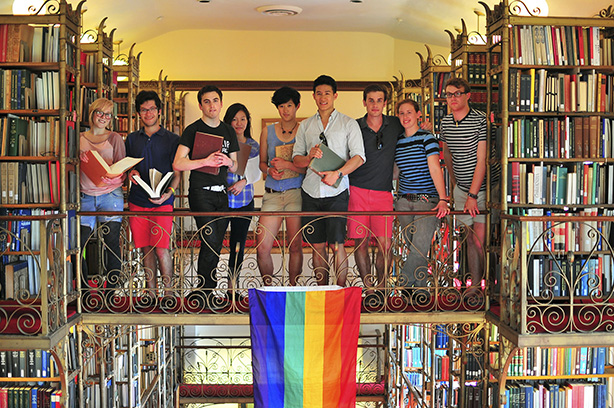
Participants in IvyQ, an annual Ivy League conference for LGBTQ-identified students, at Cornell's A.D. White Library in spring 2013. Photo: Olivia Tai.
First person: Coming out, getting together
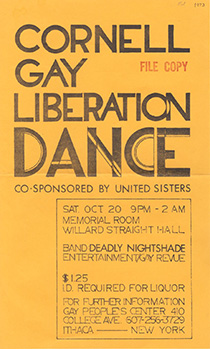
Cornell Gay Liberation Dance poster. Image: Division of Rare and Manuscript Collections. See larger image
On the occasion of the upcoming inaugural Cornell University Gay and Lesbian Alumni (CUGALA) reunion (open to all), Ezra is publishing excerpts of some of the voices that make up the ongoing, and increasingly robust, conversation about LGBT rights, climate and life on campus and beyond. How much have things changed in the 35 years since CUGALA was founded, what do people remember, and where should we go from here?
Art Leonard '74
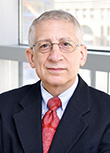
Art Leonard '74. Photo: Provided. See larger image
One of the country's leading voices in employment law, AIDS law, and gay and lesbian law, Leonard is a New York Law School professor and founder and publisher of the most comprehensive journal of its kind, Lesbian/Gay Law Notes, which he has produced for 34 years.
I wasn't out at all when I was at Cornell. I hadn't come out even to myself. … I was concerned one couldn't be a lawyer and be openly gay. And my instincts were correct. [It was only just] when I was at Cornell [that] the New York Court of Appeals issued the first decision that someone who was gay could be admitted to the bar. Because at that time, gay sex was illegal in New York; in fact it was illegal everywhere in the country except in a handful of states.
But Cornell was actually the second school in the U.S. to have a gay student organization. … Cornell did not withhold recognition. (At many universities that was a battle.) In that sense, Cornell was advanced.
I came back in '79 for [my fifth] reunion. One of my gay classmates, Mark Schwartz, drove up with me to reunion. He said, "We should really start a gay alumni group." That's how we started CUGALA.
What is the function of specialized, identity alumni groups? One of them is to provide a continuing point of contact to the university. Because Cornell basically was not doing much in the way of gay issues, many of the gay alumni were disaffected from Cornell. Many had no formal connection to the university at all. We're bringing a segment of the alumni back into contact.
Dale Brodsky Bernstein '76
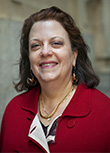
Dale Brodsky Bernstein '76. See larger image
As an officer of the board of directors of PFLAG National (Parents, Family, and Friends of Lesbians and Gays), Bernstein speaks widely as a straight ally for LGBT people. She is vice chair of the President's Council of Cornell Women's Diversity and Inclusion Committee and is the founder of UnCommon Human Resources in New York City.
PFLAG was founded 41 years ago by a mother who didn't mean to start a national organization; she just meant to stand up for her son who was beaten up by police. She attended one of the early gay pride parades holding a sign that said something like "Love and support your gay children."
Now we're fighting for more than mere acceptance. We're fighting for total and complete equality. The changes we've been able to see in the last few years are astounding. I was able to throw a wonderful wedding for our son and his husband. Even two and a half years ago, that wouldn't have been possible. No group in history has won equality and protections by fighting for it by themselves. If you take the gay population and multiply it by the families, friends and allies, then it's formidable.
One of the things I always make a point of telling [people whose children have just come out to them] is this: "Your child has been thinking about this for a long time, maybe years – trying to decide who they are and when to tell you. You can't expect yourself to instantly adjust. Talk to your child, hug them, then give yourself a break." It was never a question of would I love my child. ... Would he find someone to love? Could he get married? The answer is now "yes." You just get a different cake topping.
Dana Beyer '74
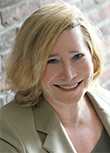
Dana Beyer '74. Photo: Provided. See larger image
A retired eye surgeon, Beyer is the executive director of Gender Rights Maryland and chair of the board of Freedom to Work. She graduated Phi Beta Kappa from Cornell and has served on the rules committee of the National Democratic Party and was a candidate for the Maryland State Legislature in 2006, 2010 and again this year. If elected, she will be the first transgender person elected to statewide office in the United States.
My earliest memory was knowing I was a girl. I never had any question. No therapist, no psychiatrist was ever able to convince me I was someone other than who I was.
Being closeted limited me and constrained my growth as a human being in the most fundamental ways. … I wanted to be a pediatric surgeon, but I couldn't allow myself to do it, because pediatrics was seen as a soft discipline in which the girls specialized and I was afraid people would question my sexuality. … It's why I do my best to make sure the next generation of kids doesn't have to ever be in a closet and have their life choices constrained by fear of rejection.
Once you realize that men and women are equal in the most fundamental sense, then it doesn't matter who you are sleeping with, how you change your body. My father said, "I have one question for you: Are you still a doctor?" It was kind of absurd. I told him, "I haven't had a brain transplant." But he also knew that as a woman, I would be treated differently, because he treated women differently. The most important benefit of male privilege is self-confidence.
David H. Steward '79
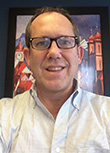
David H. Steward '79. Photo: Provided. See larger image
CEO and president of Sherman's Travel Media, an online publisher of travel deals and destination advice, Steward is chair of CUGALA's Development Committee and has served as chair of the Point Foundation and co-chair of the board of GLAAD, a leading LGBT media advocacy organization.
I remember my freshman year in U Hall 3, which thankfully has been razed. Noyes Hall was right next door, and there was a gay dance there in October of my freshman year. I just thought that was the most wonderful and amazing thing: Less than 100 feet away. That, to me, was incredible, along with the fact that there was a Cornell Gay Liberation [Front] … It said a lot to me about acceptance that an institution as notable as Cornell was supportive of on-campus gay activity. It was probably my first brush with that sort of institutional acceptance of being a gay person. And it was terribly, terribly meaningful. I actually came out October of my freshman year, 1975. There weren't many out people in those days, but I was one of them. You didn't talk about it all the time, but it was very liberating for me … We had [LGBT] dances that attracted 400 or 500 people at a time, people from all over upstate New York. … Ithaca was really a rallying point.
Rev. Carla Roland Guzman '94
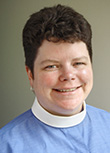
Carla Roland Guzman '94. Photo: Provided. See larger image
Rector, Episcopal Church of St. Matthew and St. Timothy, Manhattan; CUGALA officer; member, President's Council of Cornell Women.
My involvement [with LGBT issues at Cornell] began on the heels of an incident, in October 1992, just before Coming Out Day. Students had been going around chalking positive messages about coming out. All of those were defaced. That was my public coming-out catalyst.
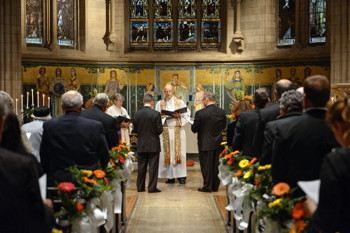
David Franklin Davis and Daniel Patrick Meyer wedding in Sage Chapel. See larger image
… I saw something on the sidewalk that said "1-800-die-homo." I remember walking into the LGBT Coalition office and asking, "What are we going to do about this?" That was what began my activist career.
I think Cornell should be a place that is at the forefront of the conversation. Sometimes the progress that the university can make is in understanding its own history. When have the core values been best exemplified? Was it because student activism was valued? Was it because we valued the uncomfortableness that pushes us forward?
We are limited in how we can express ourselves, because we're afraid of seeming ignorant, ruffling feathers, being misunderstood. By having this prescribed way of speaking, we've lost opportunities to sit and learn a way to speak and know others' experience, to be able to openly and lovingly say, "I really don't know what term to use, I don't know your experience, but I want to learn."
Jadey Kartikawati Huray '14
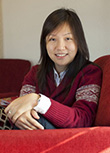
Jadey Kartikawati Huray '14. See larger image
Huray, a senior in the Charles H. Dyson School of Applied Economics and Management, is president of Haven: the LGBTQ Student Union. She is from Singapore.
To a lot of people, Haven is just another student group. But to me, it's a lifesaver. This organization shows that Cornell is dedicated to improving lives, dedicated to diversity, committed to providing a space on this campus. It's not only a home away home, but it also helps us understand ourselves and our identity.
Last semester we had an event called a National Coming Out Day Café. … One student [from the Middle East] got up there and told us his coming out story. He told us that coming to Cornell literally saved his life, because it made it possible for him to feel comfortable and safe. At the end of the event, he came up to me and thanked me for the program. This was one of those moments when I thought, "Wow, this is what we do this for."
Timeline: LGBTQ at CornellNovember 1967: Cornell Daily Sun article by Daniel M. Taubman: "Homophile League Chapter May Form Here," verifying that the Cornell administration wouldn't object. 1968: The Student Homophile League is founded at Cornell, becoming only the second group of its kind among U.S. universities. 1979: Alumni, including Art Leonard, found Cornell University Gay and Lesbian Alumni group (CUGALA), which now serves the entire LGBTQ community of alumni and is open to all. Today the group has 1,700 members. 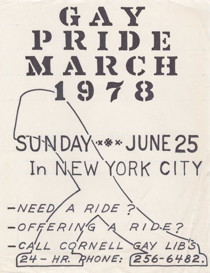 Cornell Gay Pride March poster. Image: Division of Rare and Manuscript Collections. See larger image 1980: The Human Rights Campaign, a leading national gay-rights organization, is founded. 1988: : The Human Sexuality Collection is established in the Rare and Manuscript Collections of Cornell University Library, thanks in part to the vision of Bruce Voeller and David Goodstein. 1994: LGBT Student Resource Center established. 1995: An undergraduate minor in a new Cornell program in LGBT studies (then called LGB studies) is first offered. 2004: The papers (history, correspondence, faxes, meeting minutes) of the Human Rights Campaign is donated to Cornell University Library. 2011: A rare group of 10,000 gay-themed photographs, dating to the 1860s, is donated to Cornell University Library by Harry Weintraub. June 5-8, 2014: Cornell will throw its first-ever CUGALA Reunion to coincide with Reunion Weekend. Planned events include prominent speakers, a dinner and more. |